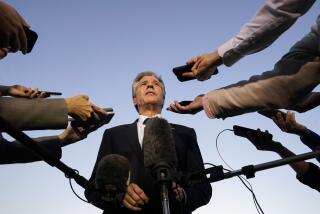CRISIS IN THE PERSIAN GULF : Arab Summit Is Only Hope for Peace, U.N. Chief Says : Mideast: But he admits he sees no clear solution to the gulf crisis. Nonaligned states reportedly take a harder line against Iraq.
- Share via
PARIS — U.N. Secretary General Javier Perez de Cuellar struck a gloomy note over the Persian Gulf crisis Saturday, saying that an Arab summit appeared to offer the only chance of a peaceful outcome.
“So far, I was unable to see any peaceful option, which I very much regret,” he told reporters after attending a U.N. Educational, Scientific and Cultural Organization (UNESCO) seminar on how to help poor countries hit by Iraq’s invasion of Kuwait.
“The only hope is that the meeting of Arab countries in Rabat takes place. (Of) that, I am not quite sure,” he said.
Morocco has called for an Arab summit to seek a political solution to the conflict. Saudi Arabia and Syria have said that they see no point in such a summit until Iraqi President Saddam Hussein agrees to pull his troops out of Kuwait, which Baghdad invaded Aug. 2.
In Dubai, United Arab Emirates, President Sheik Zayed ibn Sultan al Nuhayan reportedly called on the 101-member Nonaligned Movement, which includes the Emirates and Iraq, to move against Baghdad.
Dubai’s English-language Khalij Times, reporting Zayed’s position, also ran an editorial calling for the nonaligned group to expel Iraq.
In an editorial Saturday, the newspaper said the Nonaligned Movement had so far contributed little to help Kuwait, despite the movement’s large membership and influence, and past campaigns against superpower aggressors.
It said Zayed recently told Yugoslavia’s visiting foreign minister that the Arab state expects Yugoslavia and other nonaligned nations to “live up to their name without displaying any bias.”
Until now, many nonaligned states, including Yemen, Jordan, Algeria and Cuba, have swung behind Iraq, leaving only Western nations to spearhead the campaign against Iraqi aggression.
Jordan’s King Hussein, opening a session of Parliament on Saturday, insisted that the Persian Gulf crisis must be linked to resolution of the Arab-Israeli conflict and criticized the West for using a double standard on the two issues.
The king also questioned the motives of the nations who have deployed troops in the Persian Gulf.
“Their blatant and shameless conduct must confirm to us that their real motives are far from being the hollow claim to uphold legitimacy and defend principles,” Hussein said to applause. “Their actual goals stem from their desire to control our destiny and the Arab nation’s resources.
“We are resolved tenaciously, unflinchingly and unyieldingly to ward off the expansionist schemes,” the king said, alleging an Israeli threat of expansionism in Jordan and Western expansionism in the gulf.
In Baghdad, meanwhile, an Iraqi general said that the U.S.-led multinational force would face a “surprise” that would thwart any attack on Iraqi forces.
“The surprise element by Iraq will make the American aggression face uncalculated developments and unexpected results in (Iraq’s) reaction, which would make their execution of aggression . . . impossible,” said Maj. Gen. Mundhir Abdul-Rahman, a missile expert and head of the Iraqi army’s morale department. His comments were published Saturday in Al Kadissiya, the army’s daily newspaper.
Also Saturday, Iraq’s health minister said his nation is grappling with a “deadly serious” shortage of drugs and other medical supplies as the result of U.N. sanctions.
Minister Abdul-Salam Mohammed Said also said the country is running out of milk for babies, and complained that many countries had refused to send supplies ordered before the embargo was imposed.
The sanctions were approved as part of an international effort to force Iraq out of Kuwait. But they exempt “supplies intended strictly for medical purposes.”
More to Read
Sign up for Essential California
The most important California stories and recommendations in your inbox every morning.
You may occasionally receive promotional content from the Los Angeles Times.













